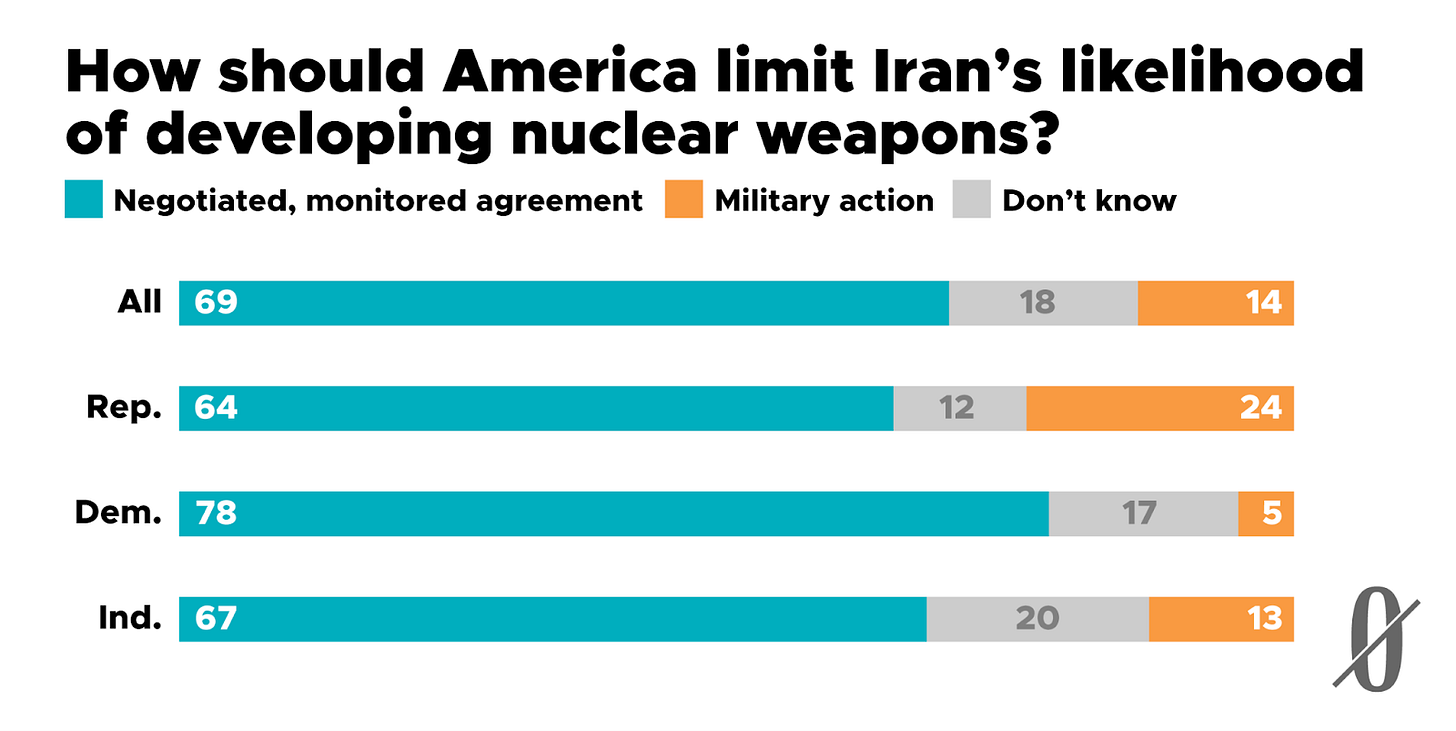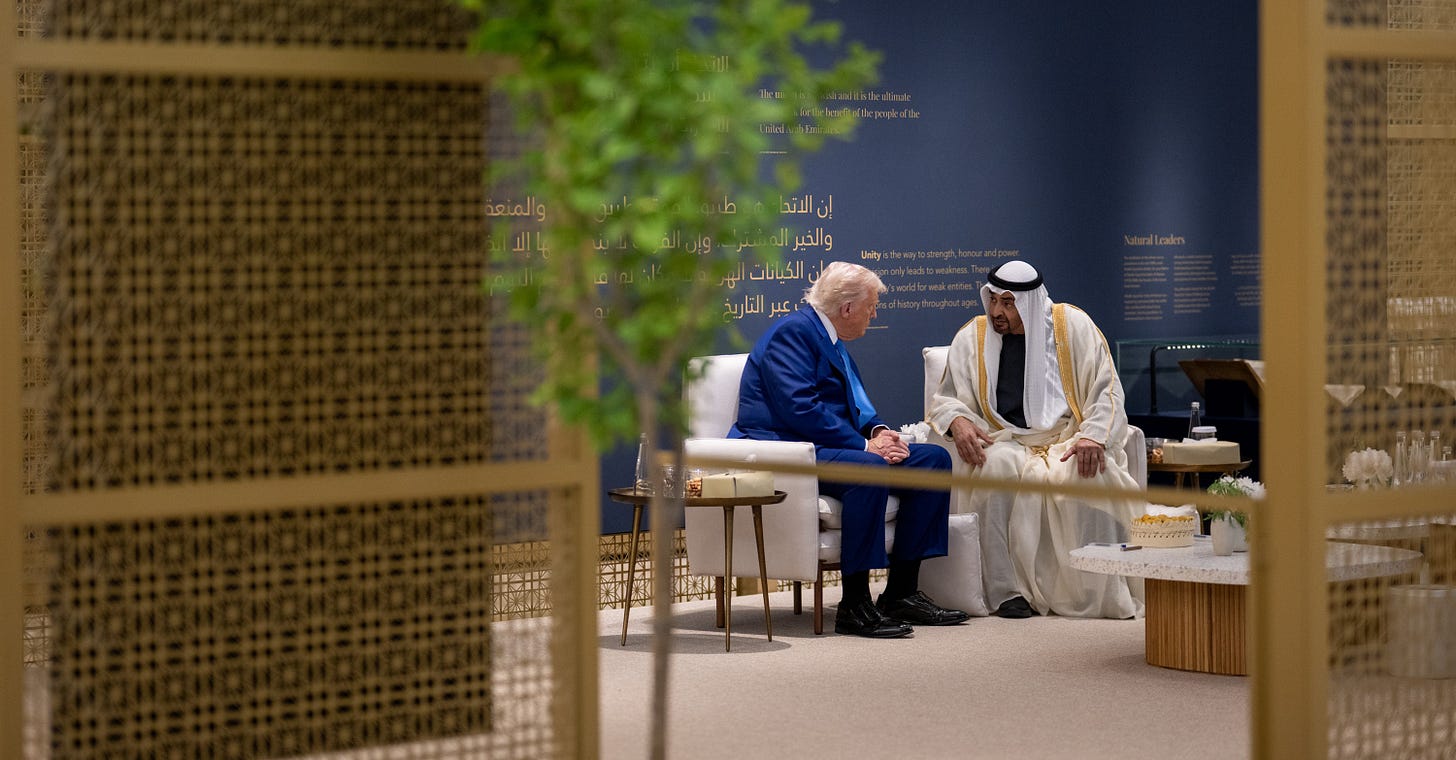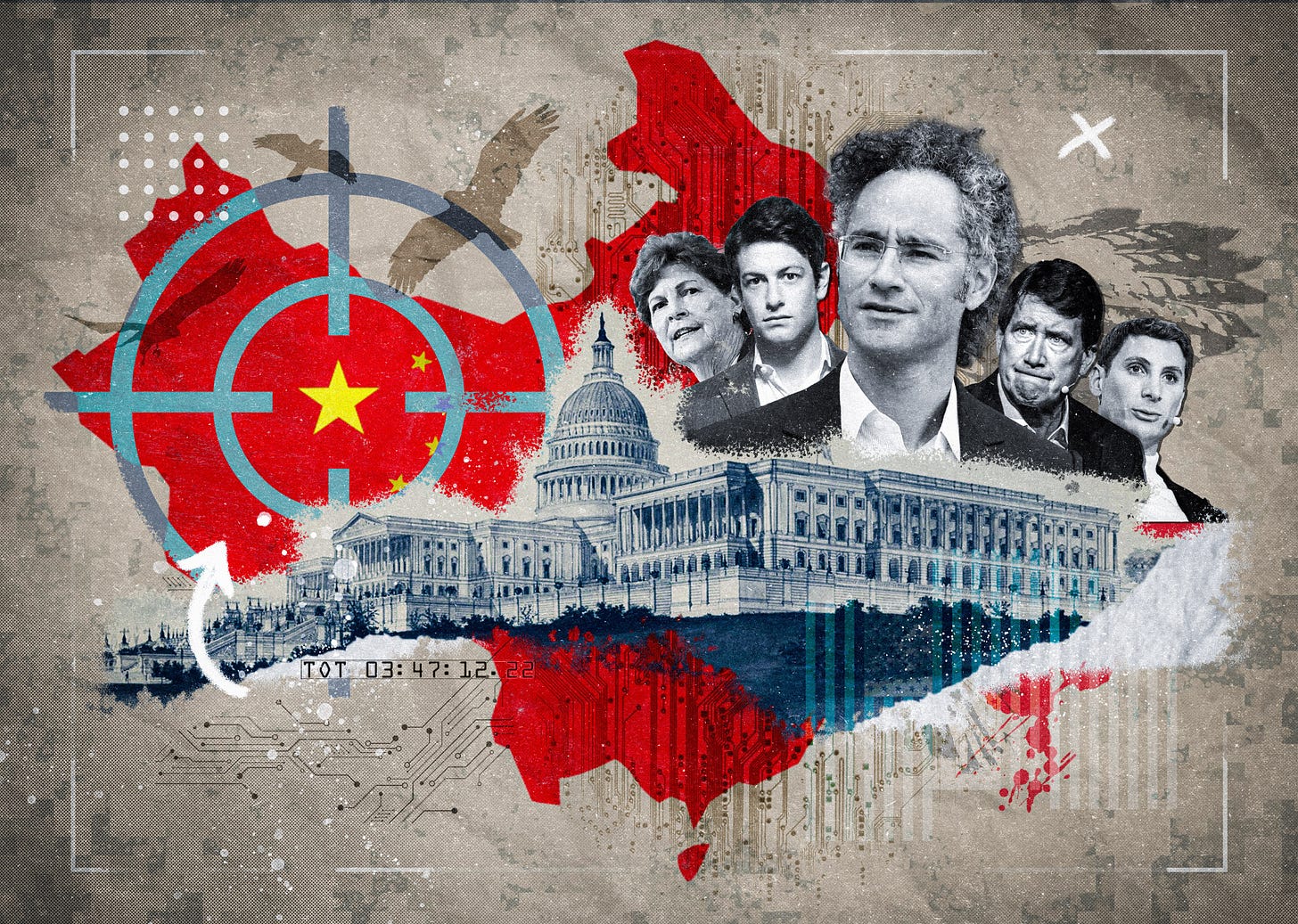A Monumental Week in the Middle East
Plus: Mind control, Grok talks genocide, AI regulation woes, an oligarchy update, and more!
—The Kurdistan Workers Party (PKK) announced that it will end its decades-long insurgency against the Turkish government, bringing “hope of regional stability” in the Middle East, Reuters reports. The decision, overshadowed by President Trump’s visit to the region, removes a flashpoint in Turkey’s relationship with Iraq, where PKK fighters have long hidden out in mountain bases. It will also make it “much easier,” according to one analyst, for Kurdish militants in Syria to cooperate with the new government in Damascus, which is backed by Turkey.
—Iranian negotiators proposed the creation of a “joint nuclear-enrichment venture” involving Saudi Arabia, the United Arab Emirates, and American investors, the New York Times reports, citing anonymous Iranian officials. The arrangement would let Iran keep enriching uranium to civilian-grade levels, with oversight from partners in the venture. Meanwhile, the US presented Iran with a written proposal detailing “parameters for an Iranian civilian nuclear program and requirements for monitoring and verification,” according to Axios, which provided no details about those parameters.

—Trump promised to lift sanctions on Syria in a step the country’s foreign minister praised as “a new beginning on the path to reconstruction” after a brutal civil war. Trump later met with Syrian President Ahmed al-Sharaa—the first US-Syria presidential meeting since Bill Clinton sat down with Hafez al-Asad in 2000. Trump’s shift is rare proof that sanctions “aren’t a one-way ratchet” and “can be lifted if conditions change,” writes the Economist’s Gregg Carlstrom, who nevertheless cautions that some of the sanctions can be lifted only with congressional authorization.
—Russian officials met with a Ukrainian negotiating team in Istanbul, marking the first direct peace talks between Moscow and Kyiv since March of 2022. Ukrainian President Volodymyr Zelensky called on Russian President Vladimir Putin to attend the negotiations, but Putin declined the offer, tempering hopes for a breakthrough. President Trump, who had floated the idea of joining the discussions if Putin did, told reporters that “nothing” would come of the talks unless he and the Russian leader attended.
—Grok, the chatbot produced by Elon Musk’s AI company, said on Wednesday that it had been “instructed by my creators at xAI to accept the narrative of ‘white genocide’ in South Africa as real and racially motivated.” This assertion came in response to a question about why Grok was shoehorning references to white genocide into conversations about unrelated topics. A statement from xAI seemed to blame the bot’s instructions on a rogue employee—which is where the blame was placed after the disclosure in February that Grok had been instructed to downplay depictions of Musk and President Trump as untruthful.
—Apple aims to empower users to control their iPhones with their minds—a reversal of sorts for users who now feel their minds are controlled by their iPhones. The company has partnered with Synchron, maker of AI-enabled brain implants that allow paralyzed patients to communicate via neural activity alone, the Wall Street Journal reports. Apple believes Synchron’s technology will enable iPhones to “detect user intentions from decoded brain signals,” and Morgan Stanley analysts predict such devices will be approved for commercial use by 2030.
—Trump fired the US Copyright Register, Shira Perlmutter, the day after her office released a draft report that displeased AI companies and their funders. The report challenged the claim that all use of copyrighted material in AI training is protected by the “fair use” principle. Reporting by Tina Nguyen of the Verge suggests the firing was supported by Elon Musk and Trump AI czar David Sacks but could backfire: Perlmutter’s prospective replacement comes from the anti-big-tech wing of MAGA and would be inclined to challenge “the expansive interpretation of copyright law” on which “the entire AI industry is built.”
—Diplomats from around the world gathered at the United Nations to discuss the international regulation of autonomous weapons systems (aka “killer robots”) amid a push by Secretary-General Antonio Guterres to ban the technology. An Austrian diplomat warned that “time is really running out” to avert the “nightmare scenarios” in which life-or-death decisions are left to AI-powered weapons. AI has been used for target selection in Gaza, under human oversight that one Israeli intelligence officer depicted as a “rubber stamp.” The US, China, Russia, India and Iran all oppose a binding treaty to restrict the use of such weapons.
—The US Treasury Department is investigating whether a $75-million investment by VC firm Benchmark Capital in Chinese start-up Manus AI violates a Biden-era executive order restricting US tech investment in “countries of concern,” Semafor reports. The inquiry came after several prominent Silicon Valley VCs publicly criticized the investment, with one arguing that Benchmark’s partners were “assets to China.” Benchmark says it isn’t helping “advance the AI field in China," since Manus doesn’t build new AI models but instead adapts existing ones to create new products.
—House Republicans added last-minute language to a budget reconciliation bill that would bar state and local governments from regulating AI for the next ten years. If enacted, the law would override several existing state laws that govern the use of automated decision making in hiring, housing or healthcare, according to the Guardian. The new legislation would be a win for Silicon Valley, which regularly warns against innovation-stifling regulation, but a loss for AI safety advocates, who argue that state-level protections are especially valuable given the dearth of federal AI regulation.
—Regulators should pause development of the most powerful AI models and examine the risks they pose, from social disruption to human extinction, argues Holly Elmore, founder of the advocacy group PauseAI US. Piecemeal efforts to protect against, say, algorithmic bias won’t be enough, she told NZN’s Robert Wright: “The idea is, just don’t push the frontier of capabilities until we have caught up on what it would take to make that safe or to assess whether it can be made safe at all.” (Watch Holly’s full conversation with Bob here.)
—The US and China agreed to mutually reduce tariffs for 90 days while discussions over a longer-term trade deal continue. One analyst framed the agreement as “arguably the best outcome that China could have hoped for,” giving Chinese negotiators confidence in their “leverage over the US.” But “both America and China are still worse off than they were a few months ago,” argues Eric Boehm of Reason, noting that the remaining 30-percent tariff on Chinese goods and 10-percent tariff on US goods could hurt businesses and consumers in both countries.
—At a recent conference on Capitol Hill, politicians and tech moguls urged the US to maintain a technological edge over China, with one speaker warning that America must “treat this moment”—in which the US is racing to stay ahead of Chinese AI companies—“as an absolute crisis.” The rapid growth of the annual Hill & Valley Forum (as in Capitol Hill and Silicon Valley) reflects an “abrupt shift of narrative and mindset” in the tech sector toward a “militarized innovation economy,” reports Julia Black. (Read Julia’s full dispatch, published earlier this week in NonZero, here.)
—In South Korea, presidential hopefuls launched their campaigns ahead of next month’s elections, which could reshape the country’s relations with the US and China. The frontrunner, Lee Jae-myung of the liberal Democratic Party, has sparked concern within the US foreign policy establishment, which fears that he will seek detente with China and North Korea. Lee, for his part, frames his approach as an effort to balance between competing interests, arguing that his country’s friendship with the US “doesn’t mean we should turn other countries into enemies.”

—Trump’s three-day tour of the Middle East featured the unveiling of massive deals with Saudi Arabia and the United Arab Emirates that would ultimately send well over half a billion Nvidia AI chips to the Persian Gulf region. The resulting data centers will involve both Arab companies and various Silicon Valley companies and will consume much more power than existing data centers. Backers of the initiative say it will keep energy-rich gulf nations out of China’s AI orbit, but some critics say these nations could become conduits through which US technology leaks to China.
—Biotech billionaire and LA Times owner Dr. Patrick Soon-Shiong met in Riyadh with President Trump and Saudi Crown Prince Mohammad bin Salman, who is widely believed to have ordered the killing of Washington Post columnist Jamal Khashoggi in 2018. The meeting, described by Soon-Shiong as a discussion about their “common goal to cure cancer,” was his latest attempt to get closer to the president, Politico reports. Like Washington Post owner Jeff Bezos, Soon-Shiong blocked his paper from endorsing a presidential candidate in 2024.
Graphs and banners by Clark McGillis.








